
Заглавная страница Избранные статьи Случайная статья Познавательные статьи Новые добавления Обратная связь FAQ Написать работу КАТЕГОРИИ: ТОП 10 на сайте Приготовление дезинфицирующих растворов различной концентрацииТехника нижней прямой подачи мяча. Франко-прусская война (причины и последствия) Организация работы процедурного кабинета Смысловое и механическое запоминание, их место и роль в усвоении знаний Коммуникативные барьеры и пути их преодоления Обработка изделий медицинского назначения многократного применения Образцы текста публицистического стиля Четыре типа изменения баланса Задачи с ответами для Всероссийской олимпиады по праву 
Мы поможем в написании ваших работ! ЗНАЕТЕ ЛИ ВЫ?
Влияние общества на человека
Приготовление дезинфицирующих растворов различной концентрации Практические работы по географии для 6 класса Организация работы процедурного кабинета Изменения в неживой природе осенью Уборка процедурного кабинета Сольфеджио. Все правила по сольфеджио Балочные системы. Определение реакций опор и моментов защемления |
My resplendent,glorious Lord, immeasurably great, Master ofСодержание книги
Поиск на нашем сайте
a#=•p›ia= -sa •-cs> :. ••«s• «•a»•=«•a sr . (Purusha- Suktam). Purusha willed to assume three forms, Aniniddha, Sankarshana,and Pradhyumna, in the 'Paramapadha".One form viz. Aniruddha transformed into ' kshira1›dhinadha", reclining on the Milk ocean. ' giC n efleJi suM nimaynn nunmpnpnooCg nJ (Purusha-Suktham). After that Purusha pervaded everywhere to protect all lives, those that take food, and those that do not. mm can 61a IN — tearing the hard heart of the demon, Hiranya.
with complexion like a blue diamond.
• nN — the sacred divya-desam of Hastisaila, or Kancheepuram,where Lord resides as Varadha'. “ Hgieirsa ap a @uppia< aieataiwréi Dyaoigyasér” ( ar•=g›a- 8«iñs ;¿gr$ — 31. ). In the next pasuram, Azhwar continues to invoke the name of the Lord of this divya-desam, with words beginning, ' in en ¥rn;@ari ir ', which is evocative of the famous Garuda-seva" 'utsavam’ for this Lord.
10-6-6.).
Our Lord Who has the eagle king Garuda as His vehicle, and the serpent king with hood embedded in jewels, and patterned in colours, for His bed,is the substance of the Veda's which speak of three-fold fires, and is the Master of Rudhra’. He abides as the presiding deity at Athiyur.
his vehicle id presides at ASH as h h fl th rd ‘
' He who rests in sleep on Thiruvanantha' embedded in jewels, and patterned in colours. ' gisrr : : jbsrix8J gño gi '- ( Kaushidhaki ). ' The bed Anantha' is of immeasurable strength.On that rests the Brahman.' In citing Garuda,the head of the 'nithyasuris', and Anantha', Azhwar pays tribute to the 'nithyavibhuti' of the Lord. JjpJJ dingy s N- He who is worshipped with three-fold 'agnis' as proclaimed by the Veda's.These three-fold fires are ’ga'rhaspathyam', 'a'vahaniyam', and 'dakshina'gni'. — Upanishads that constitute the crown of the Veda’s. He is the One who is the substance of the Veda's, and proclimed by them as the 'Parama-purusha'.Even the ancient Tamils recognised this as evident from the phrase, ' Ceug ninth ',( Quests 3.66). •••=* sñ••<=•< s-*e* $-a• nsuncn— Even Rudra' who considers himself Isvara' by virtue of having swallowed the poison that emanated while churning the Milk ocean, looks upon Narayana as his Master. ' CA e6lqniim m;iiCqnai (y Cqnaring ' ( Rukh Mandalam 10 —136.7). Kesava Who has beautiful locks, drank the poison with Rudra' as the symbolic instrument which contained the venom.' The idea is that Rudra' was just the apparent instrument for drinking the poison,Narayana being the 'Antarya'mi', who absorbed it. In referring to Rudra’ who is considered the head of the 'samsa'ris',the lila"vibhuti' of the Sriman Narayna is implied.By referring to Him as 'marsh', Azhwar drives home the point, that the Veda's which are ’apaurusheya', themselves proclaim Him as the embodiment of both 'nithyavibhuti'
My Lord, with divine Mother lovingly seated on your chest, Youare thesupreme Being with beautiful redeyes, theHead of all celestials, and our Master. You laid down on Anantha’ with a thousand hoods and mouths at the shrine at Kudandhai, wishing to abide there.
-He who has Sridevi adorning his chest. In addressing the Lord as 'Q mJm', Azhwar underscores the ’Purusha'ka'ra" (mediatrix) role of divine Mother following the meaning of the dvaya' mantra'. Again, in calling the Lord as,’ 6i weir', Azhwar continues to dwell on the 'soulabhya" of the Lord, as in the previous pasuram. ' Cg son ifi m;iiJHiunr ', ( Purusha-Suktham). g — Chief of all celestials. The parathvam of the Lord is addressed. mmJ eu{gJñ nnqJ set in u , ( (yeun i -6lnn. 1-1-1). gi;ii eifln;iC : oynñ Attn cum no•iytu : ', ( Vishnu —Suktham).
in 0 cut' ', ( Chandogya.U. 1-6-7). That Paramapurusha has two eyes like a pair of lotuses, opened up by sun's rays. 6lJgQj;ntN— Great One.
L_ &Elm Cmnuflmn& 6imn {y wishing to abide in Kudandhai, ( Kumbakonam).
- You laid down on Anantha' with one thousand hoods,mouths,and noses.
c:ozxi Ozzm c sfloeg. 98 The Lord who has ensconced himself in my heart,came down to this earth, to be raised lovingly in the cowherd family to grow up prancingaround with milkpots. As a tiny baby lyingon a banyan leaf, He swallowed the seven worlds to be tucked away in a corner of his stomach. What marvel was that ! &t - As a cowherd. The Lord of all the worlds chose in all his simplicity the lowly cowherd clan for his incarnation as Sri Krishna. ' g£iñ CgCsun p +JgJCeun p mC n p qngnu: I aggté Cum onJg;Csun g:sopgi dJJ mAC nJsmgr II
' I am not a deva',neither gandharva' nor yaksha'. I am yours and you ought not to look upon me in any other way.', reassured Krishna. ' &nr — prancing around with pots. The dance of cowherd girls and boys with milk pots on their heads is a typical cultural trait.
mN Kg@ok 0m&1 &nnno 6lor Orgy — entering my heart and perching Himself there as his abode. nJ C té 6inrr No — Azhwar's reference to seven worlds is only illustrative.It means the whole universe.Azhwar marvels at the protective instinct of the Lord in that tiny state, even
IU
as his predecessor Sri Poigai Azhwar did in his Prabhandam,
(Kesi› sum Q — 69). In a similar vein, Swami Nammazhwar sings, ' enemy so ein(y uJe6leiiQ s lK ‹sleirsaeivñ aaiñqli› ateuiteaersuaj ', ( $1(g,eirui —slua. — 4-2-1 ). ' +iqiuaJJgp
( Q sunk- can. 3-7-10).
With the celestials beseeching prayerfully for His grace, respectfully looking upto Him, and strewing fresh flowers, the Lord our Master, the Greatest of all, with rosy jingling anklet- ladenFeet,and bewitching redeyes, andever gentle and lovingtowards devotees,assumed the form of the dwarf, and strode the worlds to strip Mahabali of his kingdom. orgy e:rrN N — Lord, our Master, Kindly bless us. ' Offa› Ja srisunAJ HeroNeanAJ ', (Sarana'gathi gadyam).
mg;m ñ ' — ( Svetas. Upanishad ). ' He who is the supreme Lord of the ruling deities and the Deva' of deva's. 6ipnl — Greater than all the rest. un& —fountainhead of love and compassion. remit - as diminutive Vamana'. 11fi
in & 6im mN — accepted the earth given as a gift. From Azhwar's expression, ' csueSlsr aisrnHmsrnnnen un& ', it is evident that even in the act of dispossession, the Lord was motivated by ' va'tsalya' ' towards Mahabali as his devotee.
£1 celestials wearing the cool tulasi garland, Oh Sri Krishna, Who, in time gone by, hurled a demon disguised as calf, at another disguised as a wood-appIe,and struck both down. My love for You is like an overflowing river, bursting the limits ofmy being. Azhwar rounds up his work with the thought that his love for the Lord is like a river current that overflows the banks, and prays to Him to help him keep it contained within himself. He cites six different attributes of the Lord for this overflowing emotion. They are 1. tnt so — glorious in 'svarupa"-rupa' guna's and vibhutis. 2. H immeasurably Great. 3. - guiding all beings, like the eye. 'merit eunsrf mea |})jñ cara Cyb effect C â , (Cheung - 6inn. — 1-8-3). 4. cuJñ Ctoswf — Master of all celestial beings. 5. sdluN ñ &we&or&a- always decorated by cool tulasi garland. 6 Cioeiasi› ei$nreiflNemit & -Once upon a time, You slayed the two asura's who came to kill you disguised as a calf and a woodapple hidden in the branches.This also redounds to your greatness. o gt& • rife &{{p& with • '
If & tL{tD & &@ ID '- ( fiL3JtLI 6li.— 34).
to the Lord to help him rein in his free-flowing emotion.
The end of the commentary on Iranda'm Thiruvandhadhi.
Benedictory Verse on Sri Bhutat Azhwar Long live the One who showered the grace of 'Anbe Thagali' of hundred verses. Long live the One born on ’Aippasi Avittam', in a 'kurukathi' flower. Long live The One who brought fame to Thirukkadanmallai. Long live the One who laid the wick of melting love And lighted the beautiful lamp of ’Gnanachchudar’. Long live the One who sang the praise of the Lord Of Srirangam, Long live the sacred Feet of Bhuta Muni. LflqrN (ysuyoCnr »q n. I seek refuge at the sacred Feet of Sri Bhuta Muni.
Partial Index of Pasurams
I.References to Vibhava‘vata‘ra‘s A.Sri Vamana
Reference to Pasuram
i5
F. Other avata‘ra’s
II Referenes to Fvyadesa’s. A. Tiruvenkatam Jsn;O ajté ......gsriivayei Cent Cm 25
CTirumalirunjolai
D. Tiiukkotdyur
F. Tanjai
HTMmmelm
I Patakam
J. Mamallai
K. Tirukkovalur
70 L. Hastisailam
M. Kshirabdhi
28
N. Sri Vaikuntam
8l 88
TITLE OF OTHER PUBLICANONS AVAILABLE. 1. Sri Poigai Azhwar’s Mudhal Thiruvandhadhi - N Rajagopalan 2. s« niir«r»azusa eiran's Naa*»nui«*n iu«i vanaadu - Dr. N. Ranganathan
Available At Following Address N. RAJAGOPALAN, ‘SRI NIDHI’ T-37A, 16th Cross Street, Besantnagar, Chennai - 600 090. Tel: 491 5326. email : ShantirajaHhotmail.com
|
||||
|
Последнее изменение этой страницы: 2024-06-17; просмотров: 6; Нарушение авторского права страницы; Мы поможем в написании вашей работы! infopedia.su Все материалы представленные на сайте исключительно с целью ознакомления читателями и не преследуют коммерческих целей или нарушение авторских прав. Обратная связь - 3.145.38.80 (0.008 с.) |



 96
96
 iftio Cg t5lm p flue tariff : “, ( Varadarajasthavam 25 ). “ Lord, Thy crown by itself attests to the fact that Thou art the Emperor of all the worlds.” Similarly, the fact that the Lord at Kancheepuram has Garuda as his vehicle testifies to that.This is borne out on the strength of Azhwar's 'mangala'sa'sanam' to this Deity in this and the previous pasuram.
iftio Cg t5lm p flue tariff : “, ( Varadarajasthavam 25 ). “ Lord, Thy crown by itself attests to the fact that Thou art the Emperor of all the worlds.” Similarly, the fact that the Lord at Kancheepuram has Garuda as his vehicle testifies to that.This is borne out on the strength of Azhwar's 'mangala'sa'sanam' to this Deity in this and the previous pasuram.

 and 'lilavibhuti', and by his benediction, ' t3Jrsn their ', he further adds that such a great Master of all life and creation, has for all our benefit, and in all his love and simplicity, come to abide in Hasthisailam. By the choice of the the pronoun 'yfi ', the Azhwar has been most generously inclusive of all of us,and not merely him,and afew chosen ones, even as Swami Nammazhwar does in his line, 'C harsh g u ’, ( amir . 2-7-1. )
and 'lilavibhuti', and by his benediction, ' t3Jrsn their ', he further adds that such a great Master of all life and creation, has for all our benefit, and in all his love and simplicity, come to abide in Hasthisailam. By the choice of the the pronoun 'yfi ', the Azhwar has been most generously inclusive of all of us,and not merely him,and afew chosen ones, even as Swami Nammazhwar does in his line, 'C harsh g u ’, ( amir . 2-7-1. )

 99
99 — Brahma,Siva,and other celestials.
— Brahma,Siva,and other celestials.




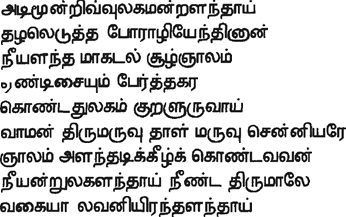
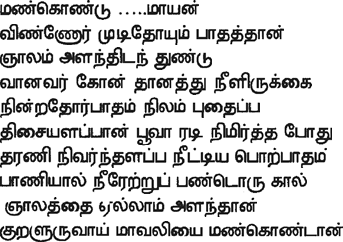 Description
Description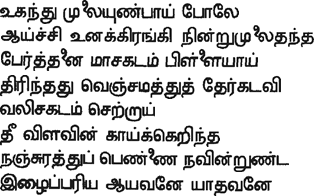 B. Krishnavata‘ra’.
B. Krishnavata‘ra’.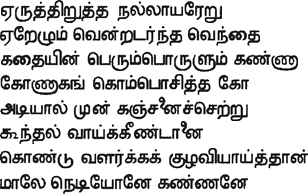 C. Nrsimhavata‘ra‘
C. Nrsimhavata‘ra‘
 30
30
 30
30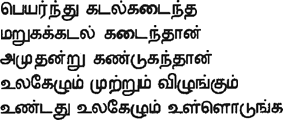 5 i
5 i
 26
26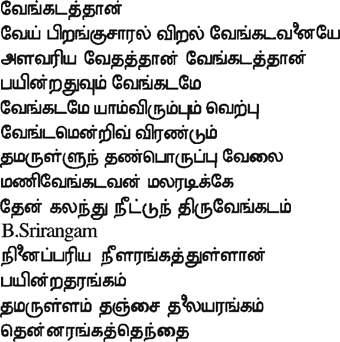 28
28 46
46 46
46
 46
46 70
70 70
70 70
70 94
94 70
70
 95
95 65
65
 96
96 2
2



